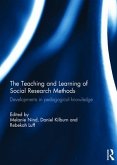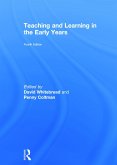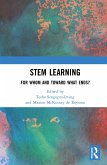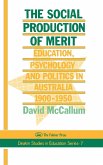The Importance of Teaching Social Issues
Our Pedagogical Creeds
Herausgeber: Totten, Samuel
The Importance of Teaching Social Issues
Our Pedagogical Creeds
Herausgeber: Totten, Samuel
- Gebundenes Buch
- Merkliste
- Auf die Merkliste
- Bewerten Bewerten
- Teilen
- Produkt teilen
- Produkterinnerung
- Produkterinnerung
Through personal stories, each contributor to The Importance of Teaching Social Issues reveals the major concerns, tenets, and interests behind their own teaching and research, including the seminal experiences underlying their motivation to explore social issues vis-à-vis school curriculum.
Andere Kunden interessierten sich auch für
![The Teaching and Learning of Social Research Methods The Teaching and Learning of Social Research Methods]() The Teaching and Learning of Social Research Methods233,99 €
The Teaching and Learning of Social Research Methods233,99 €![The Essence of Teaching Social Studies The Essence of Teaching Social Studies]() James A. DuplassThe Essence of Teaching Social Studies199,99 €
James A. DuplassThe Essence of Teaching Social Studies199,99 €![Teaching and Learning in the Early Years Teaching and Learning in the Early Years]() Teaching and Learning in the Early Years244,99 €
Teaching and Learning in the Early Years244,99 €![Social Justice Pedagogy Across the Curriculum Social Justice Pedagogy Across the Curriculum]() Social Justice Pedagogy Across the Curriculum201,99 €
Social Justice Pedagogy Across the Curriculum201,99 €![Teaching and the Law Teaching and the Law]() Jacqui GilliattTeaching and the Law221,99 €
Jacqui GilliattTeaching and the Law221,99 €![STEM and the Social Good STEM and the Social Good]() STEM and the Social Good199,99 €
STEM and the Social Good199,99 €![The Social Production Of Merit The Social Production Of Merit]() David MccallumThe Social Production Of Merit266,99 €
David MccallumThe Social Production Of Merit266,99 €-
-
-
Through personal stories, each contributor to The Importance of Teaching Social Issues reveals the major concerns, tenets, and interests behind their own teaching and research, including the seminal experiences underlying their motivation to explore social issues vis-à-vis school curriculum.
Hinweis: Dieser Artikel kann nur an eine deutsche Lieferadresse ausgeliefert werden.
Hinweis: Dieser Artikel kann nur an eine deutsche Lieferadresse ausgeliefert werden.
Produktdetails
- Produktdetails
- Verlag: Routledge
- Seitenzahl: 276
- Erscheinungstermin: 5. August 2014
- Englisch
- Abmessung: 235mm x 157mm x 19mm
- Gewicht: 554g
- ISBN-13: 9781138788527
- ISBN-10: 113878852X
- Artikelnr.: 40547312
- Herstellerkennzeichnung
- Books on Demand GmbH
- In de Tarpen 42
- 22848 Norderstedt
- info@bod.de
- 040 53433511
- Verlag: Routledge
- Seitenzahl: 276
- Erscheinungstermin: 5. August 2014
- Englisch
- Abmessung: 235mm x 157mm x 19mm
- Gewicht: 554g
- ISBN-13: 9781138788527
- ISBN-10: 113878852X
- Artikelnr.: 40547312
- Herstellerkennzeichnung
- Books on Demand GmbH
- In de Tarpen 42
- 22848 Norderstedt
- info@bod.de
- 040 53433511
Samuel Totten is Professor Emeritus of Curriculum and Instruction at the University of Arkansas.
Preface: Education in a Time of Crisis-H. Svi Shapiro. Introduction-Samuel
Totten. PART ONE: THE IMPERATIVE. 1. The Imperative to Incorporate a Study
of Social Issues into the School Curriculum-Samuel Totten. 2. The Social
Issues Education Imperative-William G. Wraga. 3. Authentic Teaching is
Venturing into Uncertainty-Geneva Gay. 4. Roots, Branches, and
Shoots-Margaret Smith Crocco. 5. A Creed for the Non-Religious:
Intellectual Freedom-Jack Nelson. 6. Opening Up to Inquiry-Jack Zevin. 7.
Teaching About Social Issues and Concerns Need Not Be an "All or None"
Circumstance-O.L. Davis. PART TWO: UNDERPINNING DEMOCRATIC SOCIETY. 8. The
Challenge of Teaching About and For Democracy when Democracy is so
Troubled-Diana E. Hess. 9. Imagining and Constructing Social Democracy: An
Educator's Creed-William R. Fernekes. 10. Preparing Effective Citizens via
an Issues Centered Approach-Mark A. Previte. 11. From Controversy to
Decisionmaking: The Heart of Social Issues Instruction-William B. Russell
III. PART THREE: CRITICAL STUDIES. 12. "Prepare to Be on Center Stage": A
Critical, Issues-Centered Approach to Teaching for Social
Understanding-Ronald W. Evans. 13. Teaching to Change the World?-Carlos
Alberto Torres. 14. Teaching for Change: Social Education and Critical
Knowledge of Everyday Life-E. Wayne Ross. 15. Knowledge, Education and
Power: A Social Justice Pedagogical Creed-Charlene Johnson-Carter. 16. From
Voicing to Naming to Re-humanization-Miguel Zavala. 17. Positionality,
Recognition, and Dialogue in Democratic Education-Steven P. Camicia. PART
FOUR: MOVING FROM THE CLASSROOM INTO THE WORLD. 18. Searching for
Understanding, Finding the Peacemakers-Elizabeth Yeager Washington. 19.
Delving into the World within and Beyond the Classroom Door: Lessons About
Inequality and Opportunity-Chara Haeussler Bohan. 20. Questioning and
Blurring Boundaries in a Context of Change: Science, Technology,
Engineering, and Mathematics (STEM) Education-Barbara Solomon Spector. 21.
Developing Global Consciousness-Merry M. Merryfield. 22. Big History as
Core Curriculum-Cynthia Brown. 23. The Centrality of Students and Their
Appreciation and Understanding of Social Issues-Robert E. Yager. Appendix:
"My Pedagogic Creed"-John Dewey.
Totten. PART ONE: THE IMPERATIVE. 1. The Imperative to Incorporate a Study
of Social Issues into the School Curriculum-Samuel Totten. 2. The Social
Issues Education Imperative-William G. Wraga. 3. Authentic Teaching is
Venturing into Uncertainty-Geneva Gay. 4. Roots, Branches, and
Shoots-Margaret Smith Crocco. 5. A Creed for the Non-Religious:
Intellectual Freedom-Jack Nelson. 6. Opening Up to Inquiry-Jack Zevin. 7.
Teaching About Social Issues and Concerns Need Not Be an "All or None"
Circumstance-O.L. Davis. PART TWO: UNDERPINNING DEMOCRATIC SOCIETY. 8. The
Challenge of Teaching About and For Democracy when Democracy is so
Troubled-Diana E. Hess. 9. Imagining and Constructing Social Democracy: An
Educator's Creed-William R. Fernekes. 10. Preparing Effective Citizens via
an Issues Centered Approach-Mark A. Previte. 11. From Controversy to
Decisionmaking: The Heart of Social Issues Instruction-William B. Russell
III. PART THREE: CRITICAL STUDIES. 12. "Prepare to Be on Center Stage": A
Critical, Issues-Centered Approach to Teaching for Social
Understanding-Ronald W. Evans. 13. Teaching to Change the World?-Carlos
Alberto Torres. 14. Teaching for Change: Social Education and Critical
Knowledge of Everyday Life-E. Wayne Ross. 15. Knowledge, Education and
Power: A Social Justice Pedagogical Creed-Charlene Johnson-Carter. 16. From
Voicing to Naming to Re-humanization-Miguel Zavala. 17. Positionality,
Recognition, and Dialogue in Democratic Education-Steven P. Camicia. PART
FOUR: MOVING FROM THE CLASSROOM INTO THE WORLD. 18. Searching for
Understanding, Finding the Peacemakers-Elizabeth Yeager Washington. 19.
Delving into the World within and Beyond the Classroom Door: Lessons About
Inequality and Opportunity-Chara Haeussler Bohan. 20. Questioning and
Blurring Boundaries in a Context of Change: Science, Technology,
Engineering, and Mathematics (STEM) Education-Barbara Solomon Spector. 21.
Developing Global Consciousness-Merry M. Merryfield. 22. Big History as
Core Curriculum-Cynthia Brown. 23. The Centrality of Students and Their
Appreciation and Understanding of Social Issues-Robert E. Yager. Appendix:
"My Pedagogic Creed"-John Dewey.
Preface: Education in a Time of Crisis-H. Svi Shapiro. Introduction-Samuel
Totten. PART ONE: THE IMPERATIVE. 1. The Imperative to Incorporate a Study
of Social Issues into the School Curriculum-Samuel Totten. 2. The Social
Issues Education Imperative-William G. Wraga. 3. Authentic Teaching is
Venturing into Uncertainty-Geneva Gay. 4. Roots, Branches, and
Shoots-Margaret Smith Crocco. 5. A Creed for the Non-Religious:
Intellectual Freedom-Jack Nelson. 6. Opening Up to Inquiry-Jack Zevin. 7.
Teaching About Social Issues and Concerns Need Not Be an "All or None"
Circumstance-O.L. Davis. PART TWO: UNDERPINNING DEMOCRATIC SOCIETY. 8. The
Challenge of Teaching About and For Democracy when Democracy is so
Troubled-Diana E. Hess. 9. Imagining and Constructing Social Democracy: An
Educator's Creed-William R. Fernekes. 10. Preparing Effective Citizens via
an Issues Centered Approach-Mark A. Previte. 11. From Controversy to
Decisionmaking: The Heart of Social Issues Instruction-William B. Russell
III. PART THREE: CRITICAL STUDIES. 12. "Prepare to Be on Center Stage": A
Critical, Issues-Centered Approach to Teaching for Social
Understanding-Ronald W. Evans. 13. Teaching to Change the World?-Carlos
Alberto Torres. 14. Teaching for Change: Social Education and Critical
Knowledge of Everyday Life-E. Wayne Ross. 15. Knowledge, Education and
Power: A Social Justice Pedagogical Creed-Charlene Johnson-Carter. 16. From
Voicing to Naming to Re-humanization-Miguel Zavala. 17. Positionality,
Recognition, and Dialogue in Democratic Education-Steven P. Camicia. PART
FOUR: MOVING FROM THE CLASSROOM INTO THE WORLD. 18. Searching for
Understanding, Finding the Peacemakers-Elizabeth Yeager Washington. 19.
Delving into the World within and Beyond the Classroom Door: Lessons About
Inequality and Opportunity-Chara Haeussler Bohan. 20. Questioning and
Blurring Boundaries in a Context of Change: Science, Technology,
Engineering, and Mathematics (STEM) Education-Barbara Solomon Spector. 21.
Developing Global Consciousness-Merry M. Merryfield. 22. Big History as
Core Curriculum-Cynthia Brown. 23. The Centrality of Students and Their
Appreciation and Understanding of Social Issues-Robert E. Yager. Appendix:
"My Pedagogic Creed"-John Dewey.
Totten. PART ONE: THE IMPERATIVE. 1. The Imperative to Incorporate a Study
of Social Issues into the School Curriculum-Samuel Totten. 2. The Social
Issues Education Imperative-William G. Wraga. 3. Authentic Teaching is
Venturing into Uncertainty-Geneva Gay. 4. Roots, Branches, and
Shoots-Margaret Smith Crocco. 5. A Creed for the Non-Religious:
Intellectual Freedom-Jack Nelson. 6. Opening Up to Inquiry-Jack Zevin. 7.
Teaching About Social Issues and Concerns Need Not Be an "All or None"
Circumstance-O.L. Davis. PART TWO: UNDERPINNING DEMOCRATIC SOCIETY. 8. The
Challenge of Teaching About and For Democracy when Democracy is so
Troubled-Diana E. Hess. 9. Imagining and Constructing Social Democracy: An
Educator's Creed-William R. Fernekes. 10. Preparing Effective Citizens via
an Issues Centered Approach-Mark A. Previte. 11. From Controversy to
Decisionmaking: The Heart of Social Issues Instruction-William B. Russell
III. PART THREE: CRITICAL STUDIES. 12. "Prepare to Be on Center Stage": A
Critical, Issues-Centered Approach to Teaching for Social
Understanding-Ronald W. Evans. 13. Teaching to Change the World?-Carlos
Alberto Torres. 14. Teaching for Change: Social Education and Critical
Knowledge of Everyday Life-E. Wayne Ross. 15. Knowledge, Education and
Power: A Social Justice Pedagogical Creed-Charlene Johnson-Carter. 16. From
Voicing to Naming to Re-humanization-Miguel Zavala. 17. Positionality,
Recognition, and Dialogue in Democratic Education-Steven P. Camicia. PART
FOUR: MOVING FROM THE CLASSROOM INTO THE WORLD. 18. Searching for
Understanding, Finding the Peacemakers-Elizabeth Yeager Washington. 19.
Delving into the World within and Beyond the Classroom Door: Lessons About
Inequality and Opportunity-Chara Haeussler Bohan. 20. Questioning and
Blurring Boundaries in a Context of Change: Science, Technology,
Engineering, and Mathematics (STEM) Education-Barbara Solomon Spector. 21.
Developing Global Consciousness-Merry M. Merryfield. 22. Big History as
Core Curriculum-Cynthia Brown. 23. The Centrality of Students and Their
Appreciation and Understanding of Social Issues-Robert E. Yager. Appendix:
"My Pedagogic Creed"-John Dewey.








